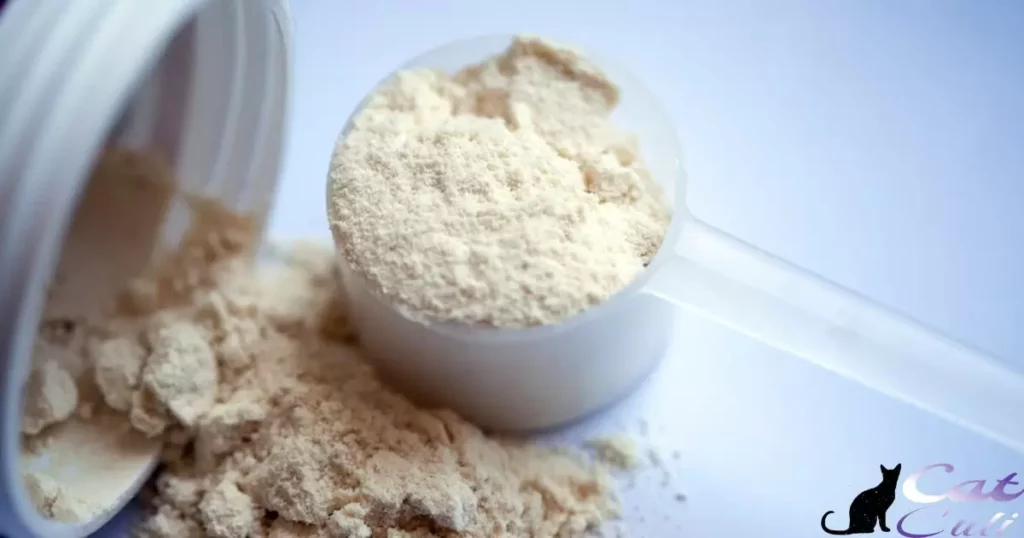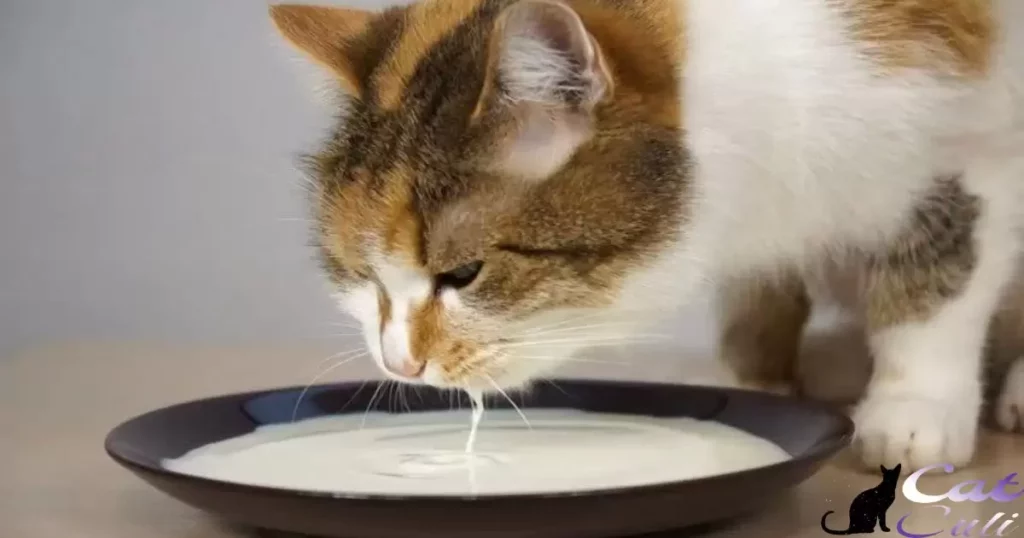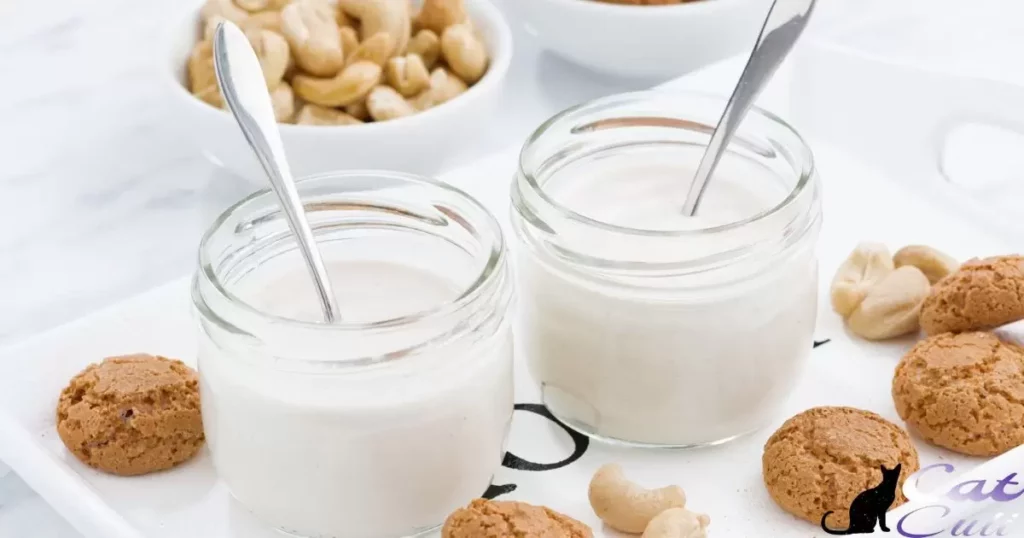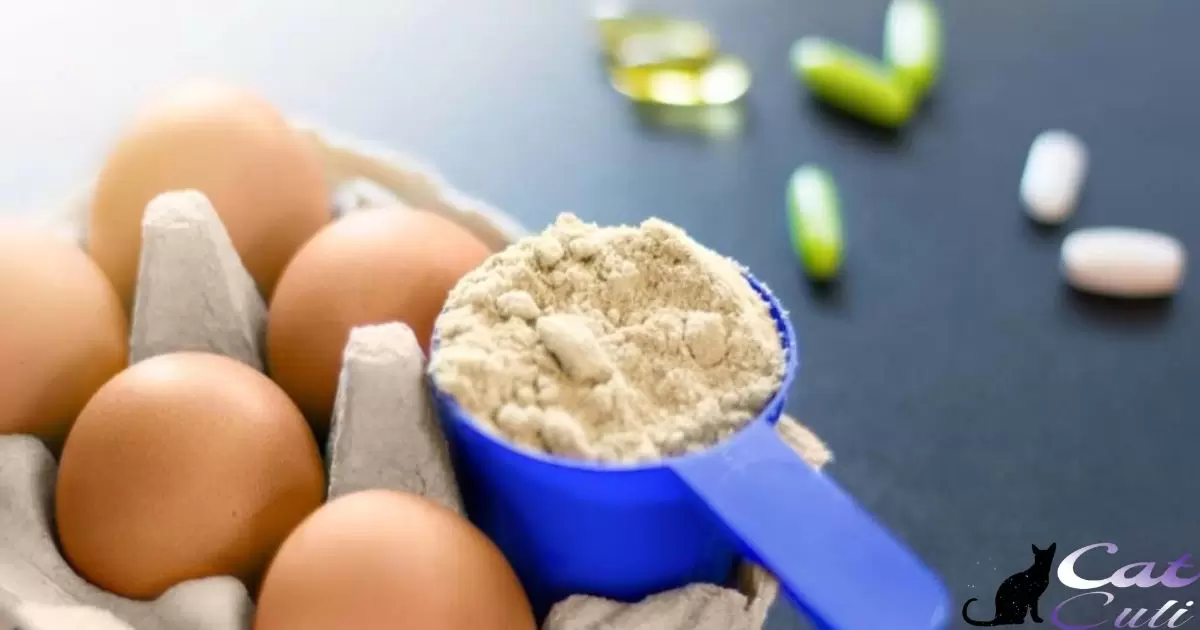Put Protein Powder In My Cat’s Food is a phrase used humorously to inquire about an unexpected change or improvement in a cat’s behaviour or health. It implies surprise at an unknown enhancement, possibly due to an unidentified addition to the cat’s diet. The phrase highlights the unexpected positive effect of an unknown action, relating to a cat’s well-being.
One day, you find your feline friend bouncing around like never before, and you can’t help but ask yourself, Who Put Protein Powder In My Cat’s Food? It’s a puzzling mystery that unveils a tale of unexpected energy levels and a playful twist to your pet’s behaviour.
It suggests an unexpected enhancement, possibly due to an unidentified addition to the cat’s diet. This whimsical query captures the curiosity surrounding an unknown factor contributing to a cat’s improved well-being, adding a touch of mystery to their daily routine.
Can Cats Eat Protein Powder
Yes, cats can consume protein powder in moderation. It’s crucial to ensure that the protein powder doesn’t contain any harmful additives, such as xylitol or artificial sweeteners, which can be toxic to cats.
Introducing protein powder into a cat’s diet should be done preferably after consulting with a veterinarian to determine the appropriate amount and type that aligns with the cat’s nutritional needs.Protein powder can be a supplemental source of protein for cats, especially for those needing an extra protein boost due to health reasons.
It’s essential to choose a high-quality protein powder specifically formulated for feline consumption and to introduce it gradually into the cat’s diet to monitor for any adverse reactions or digestive issues.
Is Protein Powder Good For Cats
Protein powder can benefit cats when used sparingly and under veterinary guidance. Cats need protein for muscle growth and overall health, and protein powder might supplement their diet if they lack protein-rich foods. Excessive protein can strain a cat’s kidneys, so moderation is key.
Ensuring the inclusion of chicken meal in cat food is vital for meeting your pet’s dietary needs. Consulting a vet guarantees the appropriate amount and type of protein powder, contributing to your cat’s overall health. It’s crucial to be cautious, as excessive protein powder intake can adversely affect cats.
Vet advice is crucial to balance protein intake, ensuring it supports a cat’s health without causing harm. Always prioritize your cat’s well-being when considering protein supplements.
Is Protein Safe For Cats?
Protein is generally safe for cats and plays a crucial role in their diet. Cats are obligate carnivores, meaning they require protein as a primary nutrient source. It helps maintain their muscle mass, supports their immune system, and contributes to healthy skin and fur.
Excessive protein intake or a diet unbalanced in essential nutrients can lead to health issues in cats. It’s essential to ensure they receive protein from high-quality sources in appropriate amounts to keep them healthy.When considering a cat’s diet, consulting a veterinarian is key to determine the right balance of protein and other nutrients.
They can offer guidance on selecting appropriate cat food that meets their nutritional needs. Monitoring your cat’s health and behaviour can help identify any adverse reactions to their diet, ensuring that the protein they consume contributes positively to their overall well-being.
Protein Is Essential For Cats

Cats absolutely need protein for a healthy life. Protein serves as a crucial building block for their muscles, skin, and fur. Without enough protein, cats might face issues like muscle weakness or a dull coat. They rely on protein from animal sources like meat to get the necessary amino acids for their bodies to function properly.
A cat’s body can’t make all the amino acids it needs, so it’s vital that they get these nutrients from their diet. Protein isn’t just about muscles; it’s the key to keeping a cat’s overall health in top shape. Ensuring they have a protein-rich diet is essential for their well being and vitality.
Is Protein Powder Safe For Animals?
| Aspect | Protein Powder Safety for Animals |
| Types of Protein Powder | Some are safe, like whey, others may be risky |
| Risks | Allergic reactions, digestive issues |
| Dosage | Proper dosage crucial for safety |
| Veterinary Consultation | Always advisable before supplementing |
| Animal Suitability | Varies based on species and individual health |
This table outlines the aspects related to the safety of protein powder for animals, emphasizing the different types, potential risks, dosage importance, the necessity of veterinary advice, and the suitability of protein supplements depending on the specific animal’s health and species.
Is Your Cat Eating Too Much Protein?
High protein intake might lead to health issues in cats. It’s crucial to monitor their food consumption closely, ensuring a balanced diet to prevent potential health complications. Consulting a vet helps in determining the appropriate protein levels for your cat’s optimal health.
High protein intake in cats might pose health risks. Monitoring their diet ensures a balanced intake, preventing potential health complications. Seeking guidance from a vet helps determine the suitable protein levels for your cat’s well-being.
Can Cats Drink Protein Milk?
Yes, cats can drink protein milk, but it’s important to ensure it’s formulated specifically for feline consumption. Protein milk designed for cats typically lacks lactose, which can be difficult for many cats to digest. It often contains ingredients that are easier on a cat’s stomach and provides essential nutrients beneficial for their health.
Moderation is key, as excessive intake of any unfamiliar substance might lead to digestive issues for your feline friend.When considering protein milk for cats, it’s wise to consult with a veterinarian to ensure it aligns with your cat’s dietary needs.
This specialized milk can be a supplement in certain situations, such as helping kittens or older cats meet their nutritional requirements. Always introduce new food or beverages gradually to monitor any adverse reactions and ensure your cat’s overall well-being.
Can Cats Drink Milk?

Cats can drink milk, but not all cats handle it well. Most adult cats are lactose intolerant, meaning they lack the enzyme to break down lactose in milk. This can lead to stomach upset, diarrhoea, or digestive issues if they drink too much. Kittens naturally drink their mother’s milk, but as they grow, their ability to digest lactose decreases.
It’s safer to offer specially formulated cat milk or small amounts of lactose-free milk as an occasional treat. Always monitor how your cat reacts to milk and consult your vet if you notice any digestive problems. Remember, water is the best and safest option to keep your cat hydrated.
Is Pea Protein Safe For Cats?
Pea protein is generally considered safe for cats when used in moderation. It’s a plant-based protein source that some cat food brands use as an alternative to animal-based proteins. Cats, being obligate carnivores, require a diet rich in animal proteins,
So while pea protein can be included, it should complement rather than replace essential animal proteins in their diet.Some cats might develop sensitivities or allergies to pea protein, leading to digestive issues or skin problems.
As with any dietary change, it’s wise to introduce pea protein gradually and monitor your cat for any adverse reactions. Consulting with a veterinarian before incorporating pea protein into your cat’s diet can provide guidance tailored to your cat’s specific needs.
The Perfect Protein For Your Furry Friend
Choosing the ideal protein for your pet is crucial for their well-being. Your furry friend thrives on high-quality proteins, like those found in lean meats or fish. These proteins support their muscles, immune system, and overall health.
When selecting pet food, prioritize sources like chicken, turkey, or salmon. These proteins provide essential nutrients your furry companion needs to stay active and happy. Remember, the perfect protein choice contributes to your pet’s vitality and longevity.
Is Whey Protein Good For Cats
Whey protein can be beneficial for cats when given in moderation. It contains essential amino acids that support muscle development and overall health in felines. Introducing whey protein into a cat’s diet should be done cautiously and under veterinary guidance to ensure it complements their nutritional needs without causing any adverse effects.
When considering whey protein for cats, it’s crucial to understand their individual dietary requirements. While it can offer some advantages, excessive or inappropriate use might lead to digestive issues. Consulting a vet before incorporating whey protein ensures it aligns with your cat’s specific health needs and contributes positively to their well-being.
A Diet For Optimal Health For Your Cat
- Balanced nutrition: Ensure your cat’s diet includes essential nutrients like protein, vitamins, and minerals.
- Adequate hydration: Provide fresh water daily to support your cat’s overall health and hydration.
- Portion control: Monitor food intake to prevent obesity and maintain a healthy weight.
- High-quality cat food: Choose reputable brands that offer balanced and species-appropriate meals.
- Regular feeding schedule: Establish a consistent feeding routine to promote digestive health.
- Consultation with a vet: Discuss your cat’s dietary needs and any specific health concerns with a veterinarian for personalized guidance.
- Avoid human foods: Refrain from feeding your cat human foods that might be harmful or lacking in essential nutrients.
- Treats in moderation: Limit treats and ensure they complement the cat’s diet without causing nutritional imbalances.
Liquid Whey For Cats
Liquid Whey For Cats is a nourishing supplement known for its benefits. It’s a protein-rich solution that offers cats an easily digestible source of essential nutrients. Pet owners often use it to boost their feline’s overall health and support their growth and development.
Many cats find Liquid Whey highly palatable, making it an effortless addition to their diet. This supplement aids in maintaining their energy levels and can be particularly helpful for kittens or senior cats needing an extra nutritional boost.
Yogurt Whey For Cats

Yoghurt whey for cats is a nutritious treat packed with beneficial probiotics. Cats love its tangy taste and it helps support their digestive health. Adding a small amount to their food can aid in maintaining a healthy gut, reducing digestive issues.
Rich in protein and calcium, yoghurt whey provides a tasty supplement for cats, promoting overall wellness. Its easily digestible nature makes it a favourable option for pet owners seeking to boost their cat’s nutrition in a simple, enjoyable way.
Is Yogurt Toxic To Cats?
Cats lack the necessary enzymes to digest lactose found in dairy, which could lead to stomach upset or diarrhoea if consumed in large amounts. Feeding yoghurt to cats should be done sparingly and in small quantities, considering their sensitive digestive systems.
If you’re considering giving your cat yoghurt, it’s essential to monitor their reaction closely. Some cats might tolerate small amounts, while others might have adverse reactions. It’s best to consult a veterinarian before introducing any new food to your cat’s diet to ensure it aligns with their specific dietary needs and doesn’t cause any health problems.
What Kind Of Yogurt Can Cats Eat?
Avoid flavoured yoghurt, especially those containing artificial sweeteners like xylitol, as they can be harmful to cats. Introduce yoghurt gradually into their diet to ensure they tolerate it well, and always consult your vet before making any significant changes to your cat’s diet.
When choosing yoghurt for your cat, opt for plain varieties without added sugars or artificial additives. Look for yoghurt with live and active cultures, as these can be beneficial for your cat’s digestive health. Moderation is key, small amounts occasionally can be a healthy addition to your cat’s diet, but it shouldn’t replace their regular cat food.
The Mystery Of Protein Powder In Cat Food Unveiled
Discovering the mystery of protein powder in cat food reveals a surprising twist in feline health. Someone added this supplement to the food, elevating the cat’s energy levels and well-being.
Unveiling this secret sheds light on a playful intervention that transformed the cat’s daily routine, bringing a touch of unexpected vitality to its days.Unravelling the enigma behind protein powder in cat food uncovers an intriguing adjustment in the cat’s diet.
Someone deliberately incorporated this supplement, resulting in a noticeable boost in the cat’s liveliness. Revealing this unknown addition adds a delightful element of surprise to the cat’s usual meals, sparking curiosity about the unconventional enhancement.
Unusual Discovery: Protein Powder Found In Cat’s Meal
An unexpected twist emerged during mealtime for a cat owner, a peculiar finding of protein powder in their feline friend’s dish. This surprising discovery added a mysterious element to the daily routine, sparking curiosity about how this supplement ended up in the cat’s meal.
The unusual presence of protein powder in the cat’s food left the owner both baffled and intrigued, prompting a quest for answers about this unconventional addition.The revelation of protein powder nestled among the cat’s meal stirred up questions, raising eyebrows over how it ended up there.
This peculiar occurrence unveiled an intriguing mystery within the pet owner’s household, inviting speculation and wonder about the reason behind this unconventional dietary inclusion. The unexpected presence of protein powder in the cat’s dish became a curious puzzle, prompting further investigation into this unusual occurrence.
Investigating The Presence Of Protein Powder In Feline Cuisine
When examining feline meals, we uncover clues about added protein powder. People may accidentally or purposefully include it, enhancing a cat’s diet. Detecting its presence reveals how it affects a cat’s health, behaviour, and overall well-being.
Exploring this inclusion in cat food helps understand its impact. We learn about potential benefits or consequences for our furry companions. Investigating this protein powder presence sheds light on a lesser known aspect of feline nutrition.
FAQ’s
Can you put protein powder in cat food?
Yes, but it’s best to consult a vet. Protein powder can aid, but excess may upset a cat’s stomach or lead to imbalances.
What happens if cats eat whey protein?
Whey protein can upset their stomachs due to lactose. Moderate intake is fine, but excessive consumption may cause digestive issues.
What is a protein meal in cat food?
Protein meal is concentrated protein extracted from various sources, like meat or fish, used to meet a cat’s dietary needs in pet food.
Conclusion
Whether intentional or accidental, additions like protein powder can impact a cat’s health. Monitoring and understanding what goes into their diet ensures their well-being.
Exploring this curiosity allows us to become more mindful caregivers. It prompts us to seek knowledge about our pets’ nutritional needs. Ultimately, the mystery behind Who Put Protein Powder In My Cat’s Food? encourages us to prioritize informed choices, ensuring our feline friends receive the best care possible.








